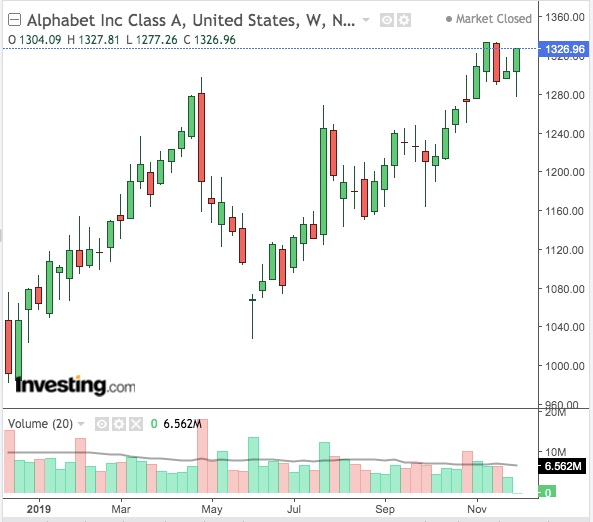Shares of Alphabet Inc. (NASDAQ:GOOGL), Google's parent company, have lagged their closest peers during 2019. An array of worries—including regulatory scrutiny and increasing competition for online advertising—the internet content and information behemoth is facing has weighed on the stock.

Unlike other tech giants like Facebook (NASDAQ:FB), Microsoft (NASDAQ:MSFT) and Apple (NASDAQ:AAPL), whose shares are all up more than 45% for 2019, thus far, Google (NASDAQ:GOOGL) has been a laggard. Until Wednesday, its shares were up about 27% on the year. Granted, that's an impressive run, but not when compared to the competition.
Change At The Top
After this week's developments, however, investors are hoping the underperformance has run its course. On Tuesday, company founders Larry Page and Sergey Brin announced they are stepping down as directors of parent Alphabet, ending their day-to-day involvement with the company.
Sundar Pichai, the CEO of Google, will now also run Alphabet, the company said. This change at the top gives Pichai control over the conglomerate’s expanding business, including its autonomous car unit Wymo, and new health-care technology efforts. Page and Brin will remain controlling shareholders and stay on the board.
Page and Brin wrote in a blog post disclosing the change:
“With Alphabet now well-established, and Google and the Other Bets operating effectively as independent companies, it’s the natural time to simplify our management structure.”
“We’ve never been ones to hold on to management roles when we think there’s a better way to run the company. And Alphabet and Google no longer need two CEOs and a President.”
Since Google completed its reorganization into holding company Alphabet on Oct. 2, 2015, Alphabet’s market value has more than doubled, to around $911 billion. An impressive decade-long run—the company went public in mid-2004—made Google’s early investors rich, hugely beating the returns delivered by the broader market at that time.
The journey this year, though, hasn’t been without speed bumps. Google is facing some serious pressures with competitors such as Amazon.com Inc (NASDAQ:AMZN) vying to take away a larger share of the internet ad business. As well, along with that threat, a variety of U.S. regulatory agencies have initiated probes into what's alleged to be the company’s anticompetitive practices, said to be stifling the competition.
Slowing Ad Revenue
Google’s earnings momentum is also showing signs of having peaked. Alphabet’s advertising revenue for the third quarter rose to a record $33.9 billion, but missed analyst expectations amid the company’s heavy investment in its cloud-computing business—seen as key to future growth but still running a distant third in the marketplace behind similar offerings by Amazon and Microsoft .
Despite these challenges, investors are liking the managment shakeup, pinning their hopes on the Indian-borne Pichai, who is now fully in charge of this complex business, where secrecy has been the key element managment's style.
“Going forward, the story is much simpler: Sundar is the only sheriff in town,” analysts at Evercore ISI wrote in a note after the change. The new CEO, who has spent 15 years at Google, rose to prominence while leading the development of Google’s Chrome browser.
Bottom Line
Google is a company with a strong moat that remains almost impossible to challenge. More than 90% of all internet searches rely on Google and its company subsidiary YouTube. Indeed, every day, Google processes 3.5 billion searches, making it perhaps the most valuable platform for advertisers.
That said, we believe Alphabet still has to diversify its enterprise. Its other ventures beyond Google must become profitable in order to remove investor concerns about the concentration of more than 90% of revenues in just one line of business. The current managment shakeup could very well be the catalyst that speeds up that process.
